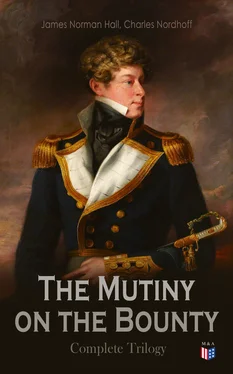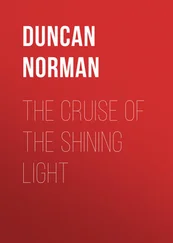“Yes, sir—one of my father’s; I showed it to Mr. Bligh.”
“I’m glad Bligh’s in command; there’s not a better seaman afloat. I am told that he is a bit of a tartar at sea, but better a taut hand than a slack one, any day! He will instruct you in your duties; perform them smartly, and remember—discipline’s the thing!”
I took my leave of Sir Joseph with his last words still ringing in my ears—“Discipline’s the thing!” I was destined to ponder over them deeply, and sometimes bitterly, before we met again.
Table of Contents
Toward the end of November I joined the Bounty at Spithead. It makes me smile to-day to think of the box I brought down on the coach from London, packed with clothing and uniforms on which I had laid out more than a hundred pounds: blue tail-coats lined with white silk, with the white patch on the collar known in those days as a “weekly account”; breeches and waistcoats of white nankeen, and a brace of “scrapers”—smart three-cornered reefer’s hats, with gold loops and cockades. For a few days I made a brave show in my finery, but when the Bounty sailed it was stowed away for good, and worn no more.
Our ship looked no bigger than a longboat among the tall first-rates and seventy-fours at anchor near by. She had been built for the merchant service, at Hull, three years before, and purchased for two thousand pounds; ninety feet long on deck and with a beam of twenty-four feet, her burthen was little more than two hundred tons. Her name—Bethia—had been painted out, and at the suggestion of Sir Joseph Banks she was rechristened Bounty. The ship had been many months at Deptford, where the Admiralty had spent more than four thousand pounds in altering and refitting her. The great cabin aft was now rigged as a garden, with innumerable pots standing in racks, and gutters running below to allow the water to be used over and over again. The result was that Lieutenant Bligh and the master, Mr. Fryer, were squeezed into two small cabins on either side of the ladderway, and forced to mess with the surgeon, in a screened-off space of the lower deck, aft of the main hatch. The ship was small to begin with; she carried a heavy cargo of stores and articles for barter with the Indians, and all hands on board were so cramped that I heard mutterings even before we set sail. I believe, in fact, that the discomfort of our life, and the bad humour it brought about, played no small part in the unhappy ending of a voyage which seemed ill-fated from the start.
The Bounty was copper-sheathed, a new thing in those days, and with her bluff, heavy hull, short masts, and stout rigging, she looked more like a whaling vessel than an armed transport of His Majesty’s Navy. She carried a pair of swivel guns mounted on stocks forward, and six swivels and four four-pounders aft, on the upper deck.
All was new and strange to me on the morning when I presented myself to Lieutenant Bligh, the ship was crowded with women,—the sailors’ “wives,”—rum seemed to flow like water everywhere, and sharp-faced Jews, in their wherries, hovered alongside, eager to lend money at interest against pay day, or to sell on credit the worthless trinkets on their trays. The cries of the bumboat men, the shrill scolding of the women, and the shouts and curses of the sailors made a pandemonium stunning to a landsman’s ears.
Making my way aft, I found Mr. Bligh on the quarter-deck. A tall, swarthy man was just ahead of me.
“I have been to the Portsmouth observatory, sir,” he said to the captain; “the timekeeper is one minute fifty-two seconds too fast for mean time, and losing at the rate of one second a day. Mr. Bailey made a note of it in this letter to you.”
“Thank you, Mr. Christian,” said Bligh shortly, and at that moment, turning his head, he caught sight of me. I uncovered, stepping forward to present myself. “Ah, Mr. Byam,” he went on, “this is Mr. Christian, the master’s mate; he will show you your berth and instruct you in some of your duties. ... And, by the way, you will dine with me on board the Tigress; Captain Courtney knew your father and asked me to bring you when he heard that you would be on board.” He glanced at his large silver watch. “Be ready in an hour’s time.”
I bowed in reply to his nod of dismissal and followed Christian to the ladderway. The berth was a screened-off space of the lower deck, on the larboard side, abreast of the main hatch. Its dimensions were scarcely more than eight feet by ten, yet four of us were to make this kennel our home. Three or four boxes stood around the sides, and a scuttle of heavy discoloured glass admitted a dim light. A quadrant hung on a nail driven into the ship’s side, and, though she was not long from Deptford, a reek of bilge water hung in the air. A handsome, sulky-looking boy of sixteen, in a uniform like my own, was arranging the gear in his box, and straightened up to give me a contemptuous stare. His name was Hayward, as I learned when Christian introduced us briefly, and he scarcely deigned to take my outstretched hand.
When we regained the upper deck, Christian lost his air of preoccupation, and smiled. “Mr. Hayward has been two years at sea,” he remarked; “he knows you for a Johnny Newcomer. But the Bounty is a little ship; such airs would be more fitting aboard a first-rate.”
He spoke in a cultivated voice, with a trace of the Manx accent, and I could barely hear the words above the racket from the forward part of the ship. It was a calm, bright winter morning, and I studied my companion in the clear sunlight. He was a man to glance at more than once.
Fletcher Christian was at that time in his twenty-fourth year,—a fine figure of a seaman in his plain blue, gold-buttoned frock,—handsomely and strongly built, with thick dark brown hair and a complexion naturally dark, and burned by the sun to a shade rarely seen among the white race. His mouth and chin expressed great resolution of character, and his eyes, black, deep-set, and brilliant, had something of hypnotic power in their far-away gaze. He looked more like a Spaniard than an Englishman, though his family had been settled since the fifteenth century on the Isle of Man. Christian was what women call a romantic-looking man; his moods of gaiety alternated with fits of black depression, and he possessed a fiery temper which he controlled by efforts that brought the sweat to his brow. Though only a master’s mate, a step above a midshipman, he was of gentle birth—better born than Bligh and a gentleman in manner and speech.
“Lieutenant Bligh,” he said, in his musing, abstracted way, “desires me to instruct you in some of your duties. Navigation, nautical astronomy, and trigonometry he will teach you himself, since we have no schoolmaster on board, as on a man-of-war. And I can assure you that you will not sup till you have worked out the ship’s position each day. You will be assigned to one of the watches, to keep order when the men are at the braces or aloft. You will see that the hammocks are stowed in the morning, and report the men whose hammocks are badly lashed. Never lounge against the guns or the ship’s side, and never walk the deck with your hands in your pockets. You will be expected to go aloft with the men to learn how to bend canvas and how to reef and furl a sail, and when the ship is at anchor you may be placed in charge of one of the boats. And, last of all, you are the slave of those tyrants, the master and master’s mates.”
He gave me a whimsical glance and a smile. We were standing by the gratings abaft the mainmast, and at that moment a stout elderly man, in a uniform much like Bligh’s, came puffing up the ladderway. His bronzed face was at once kindly and resolute, and I should have known him for a seaman anywhere.
Читать дальше











